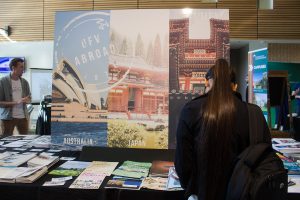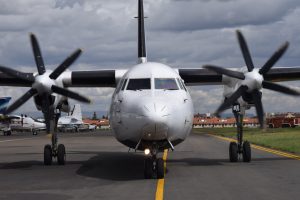17
Hope Wilde
I would like to see more sources incorporated into the chapter.
Introduction
2020 has been a year like no other, something no one has ever experienced before. COVID-19 has affected college students in many ways, but one of the main ways is not allowing them to travel anymore. COVID-19 has negatively impacted college students and the places they plan to travel to by putting restrictions on students interested in studying abroad, not allowing students to travel for breaks, and hurting the industries they would use to have those experiences.
Connection to STS Theory
Students Cannot Study Abroad

First, we will discuss how students can no longer study abroad and how this affects them. Studying abroad shapes many student’s college experience and is not the same with COVID-19. Though some schools are offering virtual options, they miss out on the physical experience itself. For example, The State University of New York at Buffalo (UB) normally takes a select group of students on an annual two-week summer trip to Tanzania for research. Due to COVID-19, Dr. Mara Huber, associate dean of undergraduate research and experiential learning at UB, has decided to make the switch for the program to be conducted online. Students will now follow a similar itinerary to the trip by “visiting” the same areas through digital maps, photographs, and videos. According to Sarah Wood, in her 2020 article “Colleges Cancel Fall Study Abroad Programs”, “For the fall, it will be the only virtual, global course offered at UB. However, Huber is “hopeful” that “people will be more open to seeing how
technology can actually enhance global types of engagement and learning” so the program can expand to include other countries and institutions” (Wood, 2020). This is just one example of many, where universities are expanding students’ technological knowledge to help them engage in an experience they would usually get to witness in person. Study abroad programs and locations are also both suffering financially because people are obviously not willing to pay if they cannot travel. NAFSA, Association of International Educators, “94% of institutions with study abroad programs reported shortened or canceled spring and summer programs, resulting in losses of $115 million; when estimated across all of U.S. higher education, potential losses total nearly $1 billion”(NAFSA, 2020). So, not only is the cancellation of programs hurting study abroad programs financially, but college students are also missing out on the unique experience of studying abroad. Even though there are some ways to still gain parts of the opportunity, it is not entirely the same.
Voices of Clemson Undergraduate Students
“I personally was planning to study abroad in the spring of 2021. Due to COVID-19, I can no longer go then. I now have to figure out when else I can go, or if I will even be able to.”
“COVID-19 has altered my college experience by not allowing students to return to campus after Thanksgiving. I also now have to get tested every time I go anywhere besides Clemson.
Students Cannot Travel for Breaks
Next, we will talk about how students cannot travel during breaks due to schools discouraging it or just canceling breaks as a whole. COVID-19 is making it so students cannot travel with their friends for breaks such as spring break and cannot see their families for breaks such as fall break. If students continue to travel during the pandemic, COVID-19 numbers will only continue to rise. Shawn Hubler, an author for the Wall Street Journal, says, “Rice, a private university in Houston, was among the first schools to adopt the strategy of a streamlined semester. It notified 7,000 students in August that the fall semester would not have the usual breaks, ending at Thanksgiving instead of around Hubler also states, “In making that decision, Rice Universities President said he drew on guidance issued by federal disease experts, pandemic modeling from other universities, Rice’s own infectious diseases faculty and the school’s “robust crisis management structure” — a result of too many Texas hurricane seasons”(Hubler, 2020). Universities are having to work with researchers and other partners to figure out how to let students still travel without spreading the virus. They have taken precautions such as canceling breaks or mandating testing before and after traveling. Our very own Clemson University allowed fall break still but required all on-campus students to get tested once a week before and after returning to campus. Popular spring break destinations have also lost a lot of money this past spring due to students not traveling. Being able to travel for breaks, whether it is to go see their families or to go on trips with friends, forms a lot of good memories for many students. With COVID-19 canceling these breaks and trips, students miss out on that experience.
Effects on Various Travel Industries

For our last topic, we will talk about the effects that students not being able to travel have on various travel industries. Many large destinations that are primarily for spring breakers suffered last spring and will continue to suffer due to the cancellation of future spring breaks. Berkeley Bryant, an author for NC State’s College of Natural Resource News, has found that “The U.S. alone has seen more than $297 billion in losses from the decrease in travel since the beginning of March”(Bryant, 2020). They need people to start traveling again, or their losses will keep adding up. Some would even argue that the travel industry was the hardest hit industry by this virus. Not only has COVID-19 impacted the destination and tourism industry, but also the airline industry because fewer people are flying. Yen Nee Lee, an author for CNBC, writes, “The average number of commercial flights per day fell from more than 100,000 in January and February this year to around 78,500 in March and 29,400 in April, according to data by Flightradar24, a website that tracks flights globally”(Lee, 2020). The airline industry is projected to have a $314 billion decline in sales by the end of 2020. Study abroad programs have also severely suffered because hardly any of their programs are going on as normal. Students must begin practicing safe travel measures so that they can start going on trips as usual and so industries can begin their process to financial recovery.
Conclusion
Not only has COVID-19 hurt the travel and tourism sector financially, but it has also affected college students by not allowing them to have their full college experience. Therefore, it has had negative impacts on both parties related to the canceling of programs and breaks. Hopefully, things will start to return to normal in the near future so that students will be able to travel and study abroad again, so the travel and tourism industry can begin to boom again.
Supplementary Materials
References
Becker, E. (2020, April 2). How hard will the coronavirus hit the travel industry? Retrieved from Travel website: https://www.nationalgeographic.com/travel/2020/04/how-coronavirus-is-impacting-the-travel-industry/#:~:text=If%20the%20pandemic%20continues%20for
Bernstein, H. (1971). Modernization theory and the sociological study of development∗. The Journal of Development Studies, 7(2), 141–160. https://doi.org/10.1080/00220387108421356
Bryant, B. (2020, July 29). The Impact of COVID-19 on Tourism. Retrieved from College of Natural Resources News website: https://cnr.ncsu.edu/news/2020/07/impact-of-covid-19-on-tourism/
Chinazzi, M., Davis, J. T., Ajelli, M., Gioannini, C., Litvinova, M., Merler, S., … Vespignani, A. (2020). The effect of travel restrictions on the spread of the 2019 novel coronavirus (COVID-19) outbreak. Science, 368(6489), eaba9757. Retrieved from: https://science.sciencemag.org/content/368/6489/395.full
Dunn, B. P. and D. (2020, September 28). Is It Safe to Travel Again? Your Coronavirus Questions Answered. Wall Street Journal. Retrieved from https://www.wsj.com/articles/all-your-coronavirus-travel-questions-answered-11582980999
Hubler, S. (2020, May 20). College Calendars in the Pandemic: No Fall Break and Home by Thanksgiving. Retrieved from https://www.nytimes.com/2020/05/19/us/coronavirus-college-fall-semester.html
Lee, Y. N. (2020, May 6). 5 charts show which travel sectors were worst hit by the coronavirus. Retrieved from CNBC website: https://www.cnbc.com/2020/05/06/coronavirus-pandemics-impact-on-travel-tourism-in-5-charts.html
(2020). Survey: Financial Impact of COVID-19 on International Education. (n.d.). Retrieved November 09, 2020, from https://www.nafsa.org/policy-and-advocacy/policy-resources/survey-financial-impact-covid-19-international-education
WOOD, S. (2020). Colleges Cancel Fall Study Abroad Programs, Look at New Ways of Global Engagement. Diverse: Issues in Higher Education, 37(11), 7.
Zalaznick, M. (2020, July 17). College student travel can spark campus COVID outbreaks. Retrieved October 11, 2020, from UniversityBusiness.com website: https://universitybusiness.com/college-student-travel-can-spark-campus-covid-outbreaks/
Images
Image 1: “Study Abroad” by University of the Fraser Valley is licensed under CC BY 2.0
“Image 2: Flight Takeoff” by Juneakhwale is licensed under CC BY-SA 4.0
